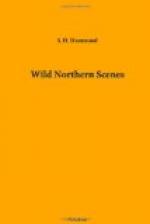“‘A little bird, Lizzie,’ replied her brother. ’Why should I like to be a little bird?’
“‘Oh, to fly around among the branches and the leaves upon the trees,’ said Lizzie, ’and among the blossoms when the morning is warm, and the sun comes out bright and clear in the sky. Oh! they are so happy,’
“’But the mornings aint always warm, and the sun don’t always come up bright and clear in the sky, Lizzy,’ said her brother, ’and the leaves and blossoms aint always on the trees. The cold storms and the winter come and kill the blossoms and scatter the leaves, and what would you do then? I shouldn’t like to be a bird, but I should like to be a big strong man like father.’
“‘Please tell me what tune it is?’ said the little boy, addressing me.
“I told him, and he turned to his little sister, saving, ’Come, Lizzie, we must go; mother said we must be home by half-after seven, and it’s most that now;’ and he put his arm lovingly around her neck, and she put hers around his waist, and they walked away towards home, talking about the leaves and the blossoms on the trees, the merry little birds, the bright sunshine, and the pleasant time they had had in the park that morning.
“It was a pleasant thing to see those two little children, so confiding, so earnest and true in their young affections, clinging to each other so closely, as if no shadow could ever come between them, or tarn their hearts from each other. How natural was that simple question put by that little girl to her brother, ’Wouldn’t you like to be a little bird?’ It was the thought of a pure young mind, that sees only the bright sunshine of to-day, whose life is in the present, and to which there is no forebodings of darkness in the future. There was philosophy, too, in the answer of her brother, a simple but suggestive sermon, ‘But the sun’ said he, ’don’t always come up bright and clear; the mornings aint always warm; the leaves and blossoms aint always on the trees. The cold storms, and the winter come and kill the blossoms and scatter the leaves, and what would you do then?’ To finite minds like ours, it would seem to have been a more beautiful arrangement of nature, could it have been, that we could always have the spring time in its glory with us; if the leaves and the blossoms were always young and fresh and fragrant; if the cold storms of winter could never come to ‘kill the blossoms and scatter the leaves;’ if the sun would always come up bright and clear; if the birds were always merry, and their glad voices always on the air. This world would be a paradise then, and one older and wiser in the learning of the schools, but not wiser or better in the heart’s affections, than that little girl, might well wish to be a little bird, to fly around among the branches, the green leaves, and the blossoms on the trees. And yet what presumption in finite man to sit in judgment upon, or criticise the wisdom of the Omnipotent God!




